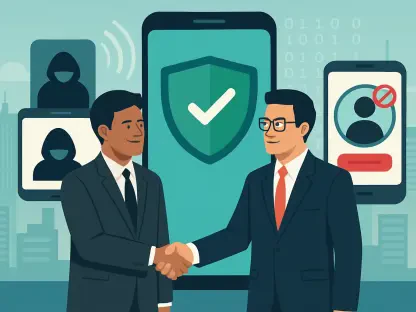In an effort to address the growing problem of spam and scam phone calls, technology company SecureG has partnered with the Cellular Telecommunications Industry Association (CTIA) to enhance the security and trustworthiness of business phone calls through an initiative known as Branded Calling ID (BCID). This industry-led project allows businesses to embed details such as logos and call reasons in their phone outreach, providing a secure and branded call experience to consumers. At the heart of this initiative are SecureG’s Public Key Infrastructure (PKI) solutions, which supply the digital signatures necessary for the authentication and security of these branded calls.
Enhancing Trust in Business Communications
Addressing Spam and Scam Call Challenges
A major challenge that the BCID initiative seeks to tackle is the rampant rise of spam and scam calls, which have become more sophisticated with advancements in artificial intelligence that enable voice impersonations. Todd Warble, Chief Technology Officer of SecureG, states that the BCID system is built on a secure-by-design foundation, ensuring that consumers can trust the legitimacy of branded calls they receive. SecureG operates the CTIA Secure Telephone Identity Certification Authority, Intermediate Certification Authority, and the Certificate Repository, which are integral components in upholding the security and authenticity of the BCID system.
The rigorous verification process embedded in the BCID system not only authenticates the caller’s brand identity but also acts as a deterrent, preventing scammers and spammers from acquiring BCID signing certificates. This initiative ensures that only legitimate businesses can make use of the branded call identifier, thus safeguarding consumers’ interests. By functioning seamlessly across different networks and mobile devices, BCID aims to create a uniform and secure calling experience for all users. Furthermore, enterprise customers incur charges only for calls that are successfully delivered with the branded identifier, making it a cost-effective solution for businesses.
Impact on Consumer Confidence
The introduction of BCID aims to significantly mitigate fraud risks by guaranteeing that only authenticated calls reach consumers, potentially restoring their confidence in answering phone calls. A survey cited recently highlighted that 75% of respondents would be more likely to answer a call if it were authenticated by features such as a name, logo, or reason for the call. This demonstrates the potential of BCID to create a safer calling environment by reducing the impact of fraudulent activities and enhancing communication between businesses and their customers.
In an increasingly digital age where fraud tactics are continually evolving, the partnership between SecureG and CTIA represents a concerted effort to secure business communications effectively. By leveraging innovative cybersecurity measures like PKI solutions, BCID provides a fortified authentication system that not only reduces the risks associated with spam and scam calls but also builds consumer trust. This initiative underscores the critical role of technological advancements in shaping the future of secure communications.
Implementing SecureG’s PKI Solutions
Digital Signatures for Call Authentication
A cornerstone of the BCID initiative lies in SecureG’s Public Key Infrastructure (PKI) solutions, which are essential for providing the digital signatures necessary for the authentication and securing of calls. PKI solutions enable businesses to embed specific details in their phone outreach, such as company logos and call reasons, thereby creating a branded and trustworthy call experience for consumers. This secure framework allows for seamless verification and ensures that the information accompanying the call is both legitimate and secure.
By using PKI solutions, SecureG maintains the integrity of the BCID system, ensuring that the digital signatures are uniquely tied to the authenticated business. This prevents malicious actors from forging or spoofing call details, thereby protecting consumers from potentially harmful scams. The PKI solutions support the overall goal of BCID by combining security with usability, providing businesses with an effective tool to enhance their outreach efforts while safeguarding consumer interests.
Role of Certification Authorities
SecureG plays a crucial role in maintaining the BCID system by operating the CTIA Secure Telephone Identity Certification Authority, Intermediate Certification Authority, and the Certificate Repository. These components are vital in issuing and managing the digital certificates necessary for the authentication of branded calls. The certification authorities follow strict verification protocols to ensure that only legitimate businesses receive BCID signing certificates, further bolstering the security and reliability of the system.
The Certificate Repository acts as a centralized database where digital certificates are stored and managed, facilitating the efficient verification of authenticated calls. This structured approach not only enhances the integrity of the BCID initiative but also streamlines the process for businesses to adopt secure communication practices. By providing a robust infrastructure for call authentication, SecureG and CTIA contribute to a more secure and trustworthy communication landscape, reinforcing the importance of continued innovation in combatting fraud and enhancing business-consumer interactions.
Fortifying the Future of Business Communication
Reducing Fraudulent Call Risks
By implementing BCID and SecureG’s PKI solutions, the initiative aims to substantially reduce the risks associated with fraudulent calls. The comprehensive security measures embedded within the BCID system ensure that only authenticated and verified calls reach consumers, thereby mitigating the threat of scams and spam. This approach not only safeguards consumer interests but also supports businesses in maintaining the integrity of their communication channels.
Moreover, BCID’s capability to provide consumers with detailed information about incoming calls promotes transparency and confidence. With features like company logos and call reasons being clearly communicated, consumers can make informed decisions about which calls to answer. This heightened level of trust can significantly improve the effectiveness of business phone outreach, as validated by the survey showing a 75% likelihood increase for answering authenticated calls.
Strengthening Business-Consumer Relationships
To combat the rising issue of spam and scam phone calls, SecureG has joined forces with the Cellular Telecommunications Industry Association (CTIA) to improve the security and reliability of business phone communications through an initiative called Branded Calling ID (BCID). This project, driven by industry leaders, enables businesses to attach specific details such as their logos and call purposes to their phone outreach efforts, thereby offering consumers a secure and recognizable call experience. Central to this initiative are SecureG’s Public Key Infrastructure (PKI) solutions, which generate the digital signatures essential for the authentication and security of these branded calls. By implementing BCID, consumers can quickly identify legitimate business calls, reducing the likelihood of falling victim to fraud. This partnership between SecureG and the CTIA aims to create a more trustworthy phone call environment, giving consumers peace of mind and enhancing the overall integrity of business communications. SecureG’s expertise in PKI technology ensures that every call is verified and secure, offering a robust solution to the prevalent problem of fraudulent phone activities.









